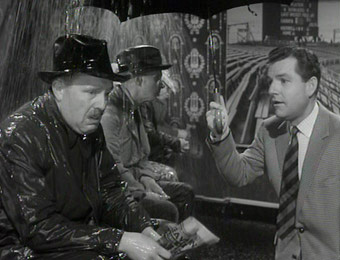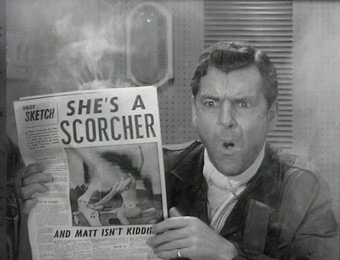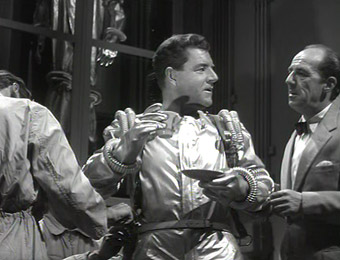"Terrible thing, truth. Particularly if the wrong people get hold of it." |
Professor Wilmot, astro-scientist |
Be honest, are there any actors you can think of who are more quintessentially English than Kenneth Moore? Sure, he has a few rivals and an elite sprinkling I'd rank as his equal, but none I could in all conscience place above him. The very thought of Moore saddled with an American or European accent is unthinkable – on screen at least, Kenneth Moore was an Englishman through and through, and a jolly fine one at that. Yes, he could play a self-centred cad – his cheerful contempt and mocking laugh allowed him to steal entire scenes in Genevieve (1953) – but for the most part he was the energetic, upbeat and thoroughly decent chap, one who would brush aside rules and protestations in order to get the job done swiftly and hopefully have some fun in the process. It's this very aspect of his portrayal of Douglas Bader – a WW2 fighter pilot who lost both legs in combat but continued to fly regardless – that has helped to mythologize a man who was apparently as arrogant as he was heroic. I will admit that I never really bought Moore as Richard Hannay in the second cinematic stab at The 39 Steps, but was happy to ignore his unlikely age (he was 40 when he played the role) to buy him as a Dirk Bogarde's medical student chum in Doctor in the House (1954).
Moore's cheerful enthusiasm found a particularly a happy home in the 1960 Man in the Moon, a wry look at the space race made when international competition in this area was really starting to hot up, but a good year before President Kennedy's public declaration of the US intention to put a man on the moon. The whole thing is viewed from a very English perspective, one that borders on and occasionally topples over into self-caricature, but one very recognisable as a product of British cinema of the period.

Following a title sequence whose lunar imagery and dramatic music suggest a lost Quatermass movie, there's a dramatic tonal shift to almost Python-esque surrealism, as the camera tilts down to reveal an idyllic English countryside setting, in the midst of which sits a bed containing a sleeping man. As he wakes to an amusingly light-hearted birdsong score and exchanges warm looks with swans and squirrels, a woman appears from the bushes wearing an evening dress and frilly stole, and on being cheerfully greeted scurries off in the opposite direction. As it turns out, there's a reasonable explanation for both of these peculiar character introductions. Well, reasonable-ish.
The man in the bed is the piratically named William Blood (played by Moore), a professional medical test subject whose latest assignment is with the Ministry of Health's Common Cold Research Centre. They've got him sleeping outside at night in an attempt to induce a cold, but Blood remains stubbornly untouched by germs of any description. "It's not healthy to be as healthy as you are!" complains one of the doctors as he fights back tears of despair. Blood's peculiar resistance to illness prompts the head of the research group to cancel his contract ("Tropical Diseases never treated me like this," Blood complains on his departure, "nor Frostbite and Exposure!"), but prods the interest of cold-stricken boffin Dr. Davidson (Michael Horden), whose team are secretly preparing a group of would-be astronauts to be the first men on the moon. He hires Blood without revealing the true purpose of the mission, which is to send him up first to make sure it's safe for the real astronauts, who are indignant that Blood would get to the moon before them. The super-fit Leo (a young but still silken-voiced Charles Gray) takes a particular dislike to this untrained interloper, and sets about trying to sabotage his training and remove him from the programme.
Moore runs on exuberance here and the film scoots along in his wake. The gags come fast and are largely disposable, As a result, I was so busy grinning at the 'British Summer Simulator' research rooms, in which subjects are battered by high wind and torrential rain ("Close that door!") that I almost missed the sign that identifies the last of these as 'Exposure to Outdoor Sports – British Traditional' and the artificial cricket ground backdrop, which is identified as Old Trafford by hand-painted wording. English eccentricity is cartooned up and celebrated, with Blood refusing to enter a test chamber without his picnic basket ("I need my elevensies!") and not donning his space helmet until he's finished his tea and toast. The comedy broadens during the training sequences, with a series of gym exercises and G-force, temperature and re-entry simulators giving rise to a range of not always successful physical gags. The best of these involves weighted boots and occurs late in the film, its success due largely to the fact that it comes out of nowhere.

Where the film develops a narrative club foot is in Blood's overdone proclamations of the merits of bachelorhood, something he hammers home at such length (there's a good three minute stretch where he repeats himself on the subject ad nauseum to colleague Norman Bird) that it's blatantly obvious from the early scenes that he's going to completely reverse this view and end up falling for and marrying girl-in-the-field Polly (Shirley Anne Field). Given that the film is playing for laughs, I wasn't completely surprised when, after falling head over heels for her man, the suddenly ditzy Polly starts cooing excitably about finding a house and arranging a wedding in a manner designed to send Blood scurrying. Except he thinks its all rather wonderful, which can't help suggest that colds are not the only disease that falling in love has suddenly made this poor fool susceptible to.
As the countdown begins, the film adopts a more serious tone and there's even a short-lived suspicion that it might be planning to sacrifice its leading man to deliver an emotional body blow in the manner of the J.B. Priestley-written Last Holiday (1950). But comedy wins out, and while the final scene is a hymn to societal convention – albeit a mildly amusing one – the moon landing narrative does conclude in reasonably satisfying fashion.
In retrospect, it seems surprising that Man in the Moon is such a little-seen film, particularly given its pedigree. Quite apart from its enjoyable cast of familiar faces, it was directed by Basil Dearden and written by regular collaborators Bryan Forbes and producer Michael Relph, who the same year had worked together on the still regularly screened The League of Gentlemen and who would go on to make well regarded works such as Victim (1961) and The Mind Benders (1962). But in the end it's Moore's film and deservedly so, despite sitting at the tail end of a feature film career – just two years later he moved to television and eventually found a new audience with roles in the fondly remembered series The Forsyte Saga and Father Brown. Man in the Moon may not have the sophistication of top class Ealing or even the aforementioned League of Gentlemen, but it is a good deal of fun and showcases Moore at his light-hearted and energetic best, and for that it should be seen and appreciated.
A 1.33:1 transfer that intermittently feels cropped from something wider, possibly 1.66:1, resulting in the odd clipped head at the edge of frame. Decent enough otherwise without popping from the screen, the image is clear and boasts good contrast range and solid black levels, but is ever so slightly soft on detail. Dust spots remain, and get a little busy in places, but overall are not a problem.

A standard mono soundtrack for British films of the period, with a narrowed dynamic range but little sign of distortion, hiss or crackle. The dialogue and music are both clear enough
Image Gallery (2:25) is a silent rolling galley of publicity stills (complete with hand-written numbers on some, lest you suspect frame grabs), while Portrait Image Gallery (1:13) is worthwhile for Moore's posing and to-camera grins. Best of all by far is the Behind the Scenes Image Gallery (3:10), not least for Moore's clowning for the camera, the shots of the film crew at work, and those in which the astronaut monkey has been posed with Moore or the camera team.
Also included (in PDF format on the review disc) is the original press book, whose considerable charm lies in the cut-out quality of its artwork, something that would doubtless have desktop publishing professionals raising their Photoshopped eyebrows.
An intermittently witty, breezily paced and enjoyably performed dig at the space race in comedy-romance clothing. It doesn't all work, but Moore is on fine form and the combined talents of Forbes, Relph and Dearden and a strong supporting cast make this well worth hunting out, particularly for those with a fondness of British cinema of the period.
|